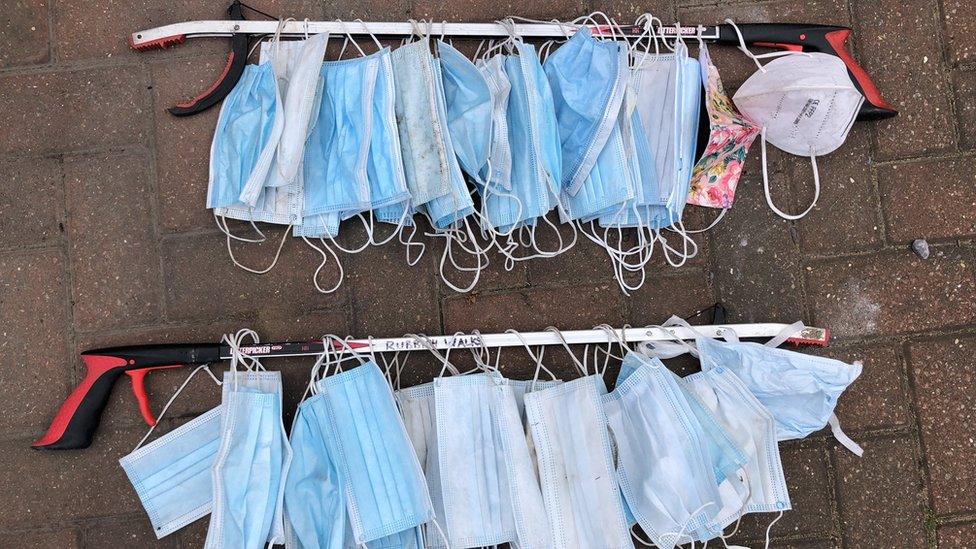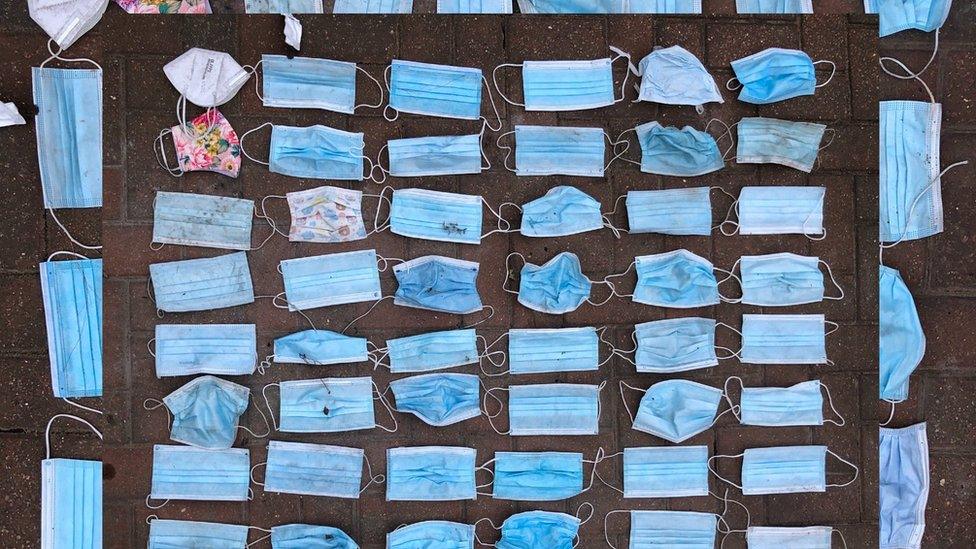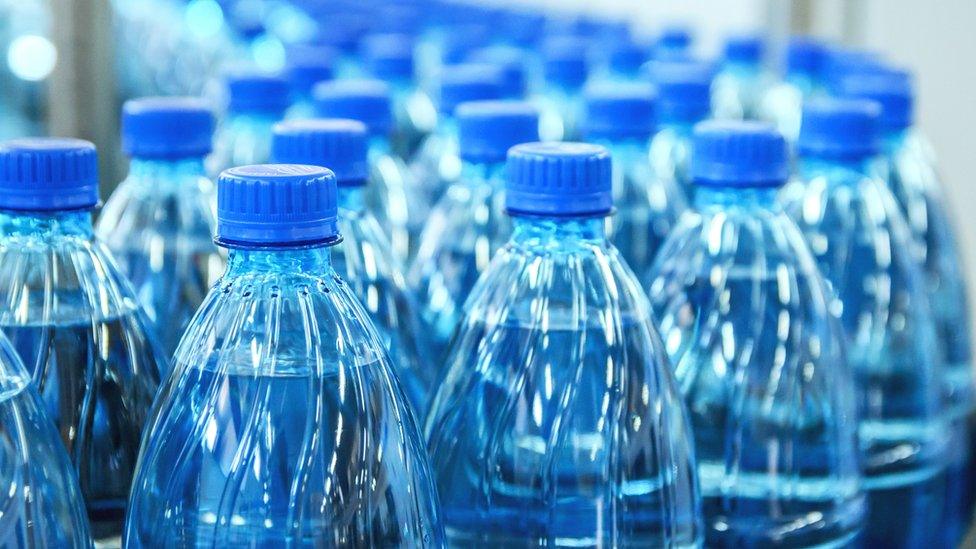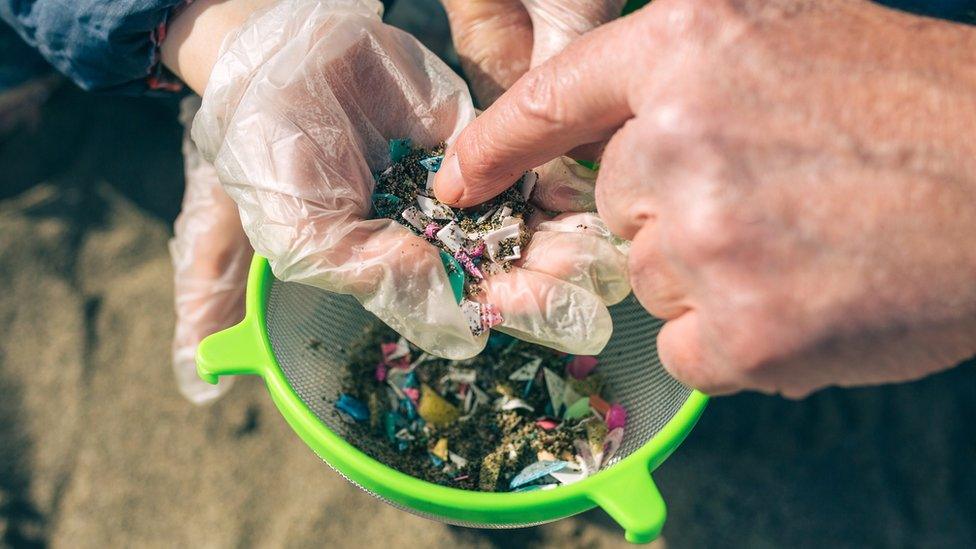Coronavirus: Masks are important, but how can we stop them harming the environment?
- Published
- comments
The pupils at Victoria Park Primary have got some handy facts and top tips for greener face mask wearing.
The majority of people in the UK have to wear a face mask or face covering when doing something indoors but not at home.
In Scotland, the rules apply to everyone aged 5 and up, in England and Wales it is everyone aged 11 and over, while in Northern Ireland the rules apply from the age of thirteen.
Covering your nose and mouth helps protect other people, as, according to the UK government, masks "cover the nose and mouth, which are the main confirmed sources of transmission of virus that causes coronavirus infection".
Masks are one of the most visible signs of the pandemic the world is dealing with.
But are too many of them being thrown away?
What masks are being used?
Single-use face masks can be bad for the environment if they aren't disposed of properly as they have a plastic called polypropylene in them.
This means most cannot be recycled, but many people aren't throwing their masks away properly.
"If only 1% of masks were disposed of incorrectly, we would see 10 million single-use masks each month spilling into the environment,' Paula Chinn, Materials Specialist at WWF-UK told Newsround.
"Littered face masks contribute to the plastic pollution problem which is harming wildlife and their habitats. 90% of seabirds have plastic in their stomachs, while other species can easily become tangled in plastic waste, including face masks that are littered".
A government spokesperson said: "Over the next couple of months, we are considering how we can inform the UK's longer-term PPE use strategy into the future, including taking into account environmental concerns."

These are just a few of the masks found in one part of the UK, in one day!
How many masks are becoming litter?
Laura Foster, from the Marine Conservation Society, said: "Just look at rivers such as the Thames and you'll see them floating by.
"When they're whole, wildlife is going to get tangled in it or the plastic is going to be ingested. They aren't going to biodegrade either, although they will break up, introducing more microplastics into the sea and the food chain."
Jason Alexander, an anti-litter campaigner in Suffolk, says he found more than 50 masks littering the ground in just one day.
He said he isn't surprised by what he found.

These masks were found littered in a town in the UK
The face mask risk
Paula Chinn says that although face masks have played an, "essential role keeping hospitals running and protecting our frontline workers" during the pandemic, the effect plastic is having on the environment can't be ignored.
Plastic pollution was already a huge problem for the world and disposable face masks are adding to that ever growing problem."
There are things everyone can do to help and Paula has some advice when it comes to using and disposing of single-use face masks.
"At home, reusable and washable face masks are a great step forward for most people. Even though these masks are not medical grade, they are perfectly fine for people in everyday, low-risk situations such as shopping, in restaurants and using public transport. We have to move away from 'throwaway culture'."

This gull had to be saved by the RSPCA
If you do have to use a single-use mask, there are ways to make sure you protect the environment and wildlife.
The World Health Organization (WHO) recommends you take off your mask as soon as it is damp and place it in a closed bin, and wash your hands afterwards.
Before placing it in the bin you can cut the white strings on the masks to prevent animals being tangled in them or harmed.
Amanda Keetley, founder of Less Plastic, said: "Unless you're in a medical situation, the best option is to get a reusable face mask that can be worn and washed again and again."
Do you have any ideas how to solve the challenge of disposable masks? What do you think about the issue? Let us know in the comments below.
- Published19 March 2022

- Published7 October 2020

